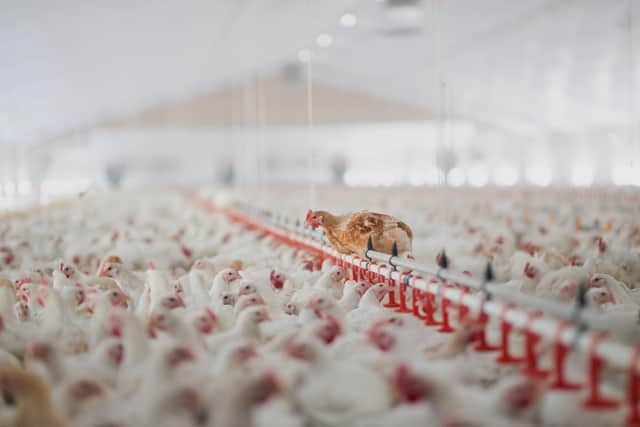Daventry business wins national award with £50,000 grant for ‘innovative’ poultry market biosecurity project
and live on Freeview channel 276
A business based in Daventry has won a national innovation award for a project aiming to advance biosecurity in the poultry market.
Residual Barrier Technology (RBT), a company that develops, formulates, and manufactures biodegradable hygiene and infection control solutions, was awarded a grant of £50,000 by Innovate UK.
Advertisement
Hide AdAdvertisement
Hide AdInnovate UK is a non-departmental public body operating at arm's length from the UK Government which provides funding and support to organisations for creating new products and services.


The goal of RBT's project is to improve poultry mortality rates and increase output while reducing water and chemical use.
Christine Brander, aged 66, RBT founder and executive chair, said: “Winning the award felt amazing. The application process was rigorous and there was a lot of competition from other innovators. The whole team here at RBT are delighted that Innovate UK recognised the importance and innovative nature of our project.
“An important aspect of winning the grant is providing inspiration for future and upcoming young entrepreneurs and scientists. As part of the grant project, I will be reaching out to local students to encourage them to pursue their dreams. I’d particularly like to encourage young ladies into the exciting world of science where women are currently underrepresented.
Advertisement
Hide AdAdvertisement
Hide AdWith a commitment to biodegradability and sustainability, RBT, incorporated on September 3, 2009, delivers products, including soap, detergents, and other chemical products, designed for a wide range of sectors, including healthcare, agriculture, education, and hospitality.


Christine said: “We have developed new disinfectants and methods of application that have many advantages.
“Increasingly, producers are recognising the need to switch from harsh chemicals to effective biodegradable options that reduce chemical load and environmental impact.”
RBT applied for the Innovate UK Unlocking Potential Award funding competition, which seeks to promote investment in diverse talent throughout the UK, to help develop their company.
Advertisement
Hide AdAdvertisement
Hide AdChristine secured the funding with the awarded project, ‘Improving Biosecurity, Sustainability, and Affordability in the Poultry Sector’.
She said: “Involvement with Innovate UK will help us to innovate our new procedures into the poultry market and provide valuable evidence that our vision for change in that sector is viable and has merit.
“Improved biosecurity leads to improved flock health and yields.”
RBT aims to significantly reduce water and chemical usage in poultry farming. In addition to lowering biosecurity expenses, the company seeks to improve yields and poultry health.
Advertisement
Hide AdAdvertisement
Hide AdAt the heart of this initiative is Protectus Air, a dry nebulising technology developed by RBT which simplifies disinfection protocols in buildings, disinfecting both indoor surfaces and the air. Protectus Air is safe to use around humans and chickens and is designed to protect poultry health while minimising environmental impact.
The initiative promises to increase poultry farming output without compromising on biosecurity or sustainability.
Through this project, RBT, dedicated to enhancing global hygiene and infection control practices, aims to set new standards in the poultry sector.
“Our solutions aim to improve disinfection in the sector,” said Christine.